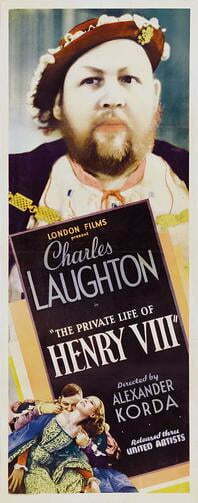“Inside the Crown: The Private Life of Henry VIII -1933, Revealed – Drama, Intrigue, and Tudor Legacy”
HE GAVE HIS WIVES A PAIN IN THE NECK And did his necking with an axe. Henry, the Eighth Wonder of the World! And this picture…the wonder of all time!
Step Inside the Royal Court: Why ‘The Private Life of Henry VIII’ Still Shocks, Entertains, and Inspires Nearly a Century Later”

Title: The Private Life of Henry VIII
Release Year: 1933
Director: Alexander Korda
Producers: Alexander Korda
Screenplay: Lajos Bíró (adaptation), John Van Druten (dialogue), based on the play by Henrietta and Herbert Brewer
Music Composer: Kurt Schröder
Cinematography: Georges Périnal
Production Design: Vincent Korda
Main Cast of The Private Life of Henry VIII:
- Charles Laughton as King Henry VIII
- Robert Donat as Thomas Culpeper
- Merle Oberon as Anne Boleyn
- Elsa Lanchester as Anne Boleyn (later scenes)
- Binnie Barnes as Catherine Howard
- Miles Mander as Cardinal Wolsey
- Desmond Tester as Prince Edward (uncredited cameo)
Genre: Historical Drama / Biography
Language: English
Runtime: Approximately 97 minutes
Production Countries: United Kingdom
Notable Facts:
- Charles Laughton won the Academy Award for Best Actor for his performance.
- The film was one of the first British films to achieve major international success, especially in the U.S.
- It helped establish Alexander Korda as a leading figure in British cinema.
- Noted for its lavish costumes and set designs that realistically depicted Tudor England.
- Influenced future historical dramas and biographical films with its mix of spectacle and character-driven storytelling.
Released in 1933, The Private Life of Henry VIII stands as a landmark in British cinema and remains a fascinating window into both the Tudor era and the early years of sound film. Directed by Alexander Korda, this historical drama not only introduced international audiences to British filmmaking talent but also showcased the magnetic presence of Charles Laughton, whose portrayal of the larger-than-life monarch is unforgettable. While The Private Life of Henry VIII is nearly a century old, its combination of drama, wit, and spectacle still offers contemporary viewers a compelling cinematic experience.
Story and Script
The narrative focuses on the private and political intrigues surrounding King Henry VIII, particularly his six marriages. Unlike modern historical epics, the film leans heavily into the theatrical, balancing sharp dialogue with moments of tragic introspection. The script, adapted from the play by Henrietta and Herbert Brewer, condenses complex historical events into a manageable and engaging story, emphasizing the human flaws behind the iconic king. Themes of power, desire, and the consequences of absolute rule are handled with both humor and gravitas, making the story accessible to audiences beyond history buffs.
Performances
Charles Laughton’s performance as Henry VIII is nothing short of legendary. He dominates the screen with a blend of charisma, menace, and vulnerability that makes Henry a multi-dimensional figure rather than a simple caricature. Laughton’s physical presence—his booming voice, commanding gestures, and expressive face—perfectly embodies the king’s excesses and insecurities. The supporting cast, including Elsa Lanchester as Anne Boleyn, provides nuanced performances that enhance the film’s dramatic tension, while the ensemble scenes capture the complex dynamics of court life with subtlety and humor.
Direction and Visuals
Alexander Korda’s direction demonstrates remarkable control over both spectacle and intimacy. The film’s set design and costume work are lavish, providing a vivid sense of Tudor opulence without overwhelming the narrative. Cinematographer Georges Périnal captures the grandeur of palace interiors while employing close-ups to emphasize character-driven drama, a technique that was innovative for the early 1930s. The pacing occasionally drifts, particularly in longer dialogue-heavy sequences, but Korda balances these moments with visually striking tableaux that maintain audience engagement.
Soundtrack and Audio Design
The Private Life of Henry VIII’s musical accompaniment, composed by Kurt Schröder, is a mix of stately classical motifs and dramatic flourishes that underscore the tension and humor in key scenes. While the score reflects the limitations of early sound recording technology, it complements the story rather than overpowering it. Dialogue clarity is generally strong, a notable achievement given that the film was produced during the relatively early years of synchronized sound in British cinema.
Context and Influence
When The Private Life of Henry VIII premiered, it was a groundbreaking achievement for the British film industry, earning international acclaim and even an Academy Award for Laughton. Its release came during the pre-Code Hollywood era, a time when filmmakers explored more adult themes and complex characterizations. The film’s success helped pave the way for other historical dramas and influenced the way royalty and political intrigue were portrayed on screen. It also demonstrated that British films could compete globally, both artistically and commercially.
Overall Impact
Nearly ninety years after its release, The Private Life of Henry VIII remains a masterclass in character-driven historical storytelling. While modern audiences might notice the pacing and theatricality typical of early 1930s cinema, the film’s combination of commanding performances, rich visuals, and historical intrigue makes it a rewarding watch. It is particularly recommended for viewers interested in classic cinema, British history, or iconic performances that have shaped film acting for decades.
Conclusion
The Private Life of Henry VIII is more than a historical biopic; it is a cinematic milestone that continues to entertain and educate. Its enduring legacy lies in Laughton’s unforgettable portrayal, Korda’s visionary direction, and the film’s ability to make history both intimate and grand. For audiences seeking a window into early British cinema or a dramatic exploration of one of England’s most notorious kings, this film is undoubtedly worth watching today.

 Buy me a coffee
Buy me a coffee